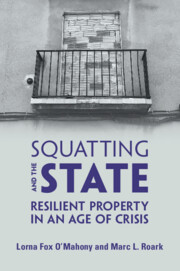Book contents
- Squatting and the State
- Squatting and the State
- Copyright page
- Dedication
- Contents
- Preface and Acknowledgments
- Introduction Squatting, Scale, and the State
- Part I Squatting and the State
- Part II Resilient Property in an Age of Crises
- 5 Resilient Property Methodology
- 6 Possession, Pragmatism, and Homeless Squatters
- 7 Ownership and Absent Owners
- 8 Aggregated Interests
- Part III Resilient Property in Action
- Bibliography
- Index
6 - Possession, Pragmatism, and Homeless Squatters
from Part II - Resilient Property in an Age of Crises
Published online by Cambridge University Press: 11 August 2022
- Squatting and the State
- Squatting and the State
- Copyright page
- Dedication
- Contents
- Preface and Acknowledgments
- Introduction Squatting, Scale, and the State
- Part I Squatting and the State
- Part II Resilient Property in an Age of Crises
- 5 Resilient Property Methodology
- 6 Possession, Pragmatism, and Homeless Squatters
- 7 Ownership and Absent Owners
- 8 Aggregated Interests
- Part III Resilient Property in Action
- Bibliography
- Index
Summary
In Chapters 6–8, we examine how state responses to squatting, and the lenses through which the competing claims of stakeholders are seen, articulated, prioritized, and evaluated, frame debates about homeless squatting in empty land in the context of complex, competing, multi-scalar normative goals. In doing so, we continue to recognize that squatting conflicts are embedded in political, economic, cultural, social, and legal jurisdictional contexts, and that, in these contexts, assumed identities and characteristics are assigned to competing actors, as legal and extra-legal norms are applied to tackle problems and adjudicate conflicts. In this chapter we focus, firstly, on the conceptual and pragmatic meanings – and the “scaled production” – of possession in common law and civil law traditions. We then examine how the act of squatting, and the status of squatters, has been rescaled in recent years. On one axis, we read adaptations in state responses to property events – for example, the criminalization of squatting – as reflecting the upscaling or elevation of the squatting “event.” The criminalization of squatting – or any other erstwhile non-criminal activity – signals that a previously low-stake event has accrued high-stakes impact for the state. It reveals new or emerging pressures on the state to take “other-regarding” action, mediating directly between competing (erstwhile private) claims (for example, owners, squatters, investors, neighbors). And the nature of the state’s response signals to the alignment of particular resilience claims with the state’s (or the government’s) own resilience needs. In focusing on the problem of homeless squatting on empty land through the prism of the homeless squatter, we adopt the framing techniques discussed in Chapter 5: placing the squatter at the center of the network of competing stakeholders and examining the “webby relations” that shape, mediate and separate representations of squatters in accounts of homeless squatting on empty land.
Keywords
- Type
- Chapter
- Information
- Squatting and the StateResilient Property in an Age of Crisis, pp. 231 - 259Publisher: Cambridge University PressPrint publication year: 2022

